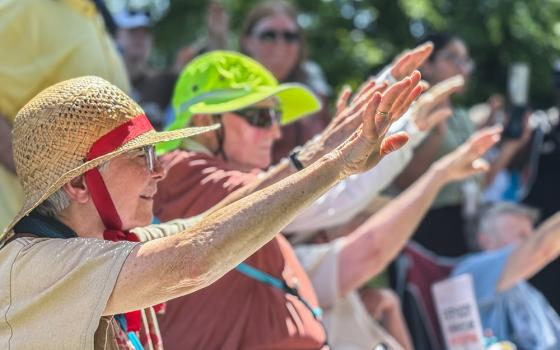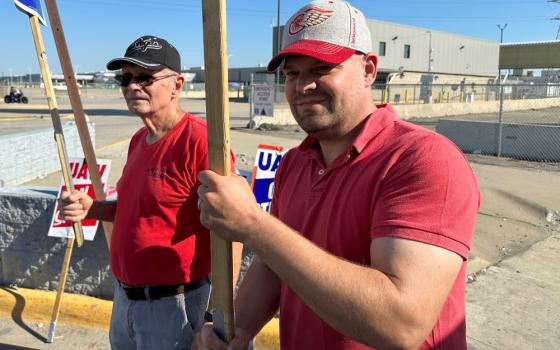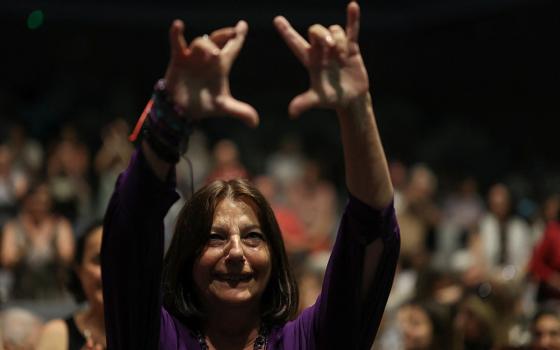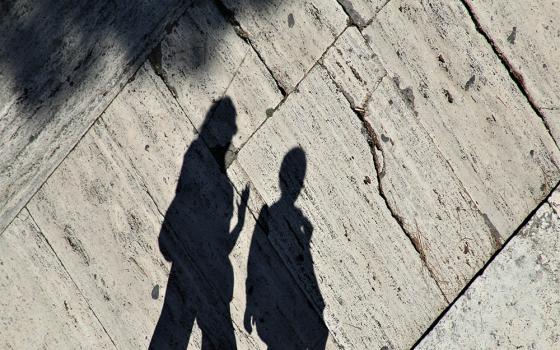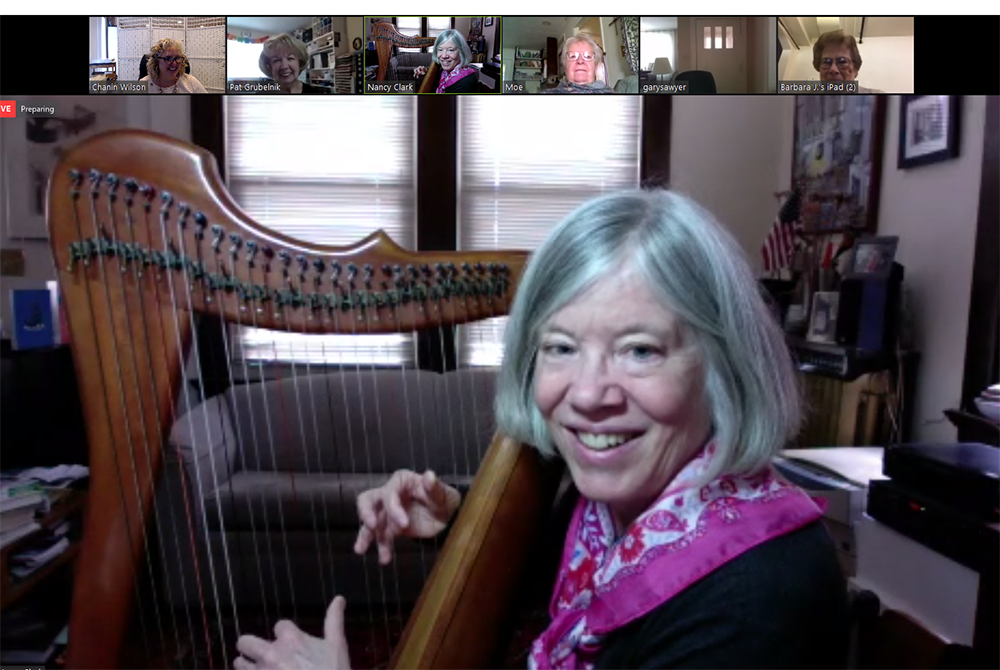
Nancy Bick Clark, an associate with the Sisters of Charity of Cincinnati, Ohio, plays the harp during a Zoom commitment ceremony in March 2020 for new associate Jean Simpson. (Courtesy of the Sisters of Charity of Cincinnati)
Associates used to visiting the motherhouse of the Sisters of Charity of Cincinnati, Ohio, found something unexpected in March 2020: They were locked out.
Chanin Wilson, director of associates for the congregation, said the lockdown — like those imposed at convents around the world because of the coronavirus pandemic — had to be done to protect the sisters inside. But it was still difficult for the associates.
"It was very new for a lot of them, especially those who live near the motherhouse and were used to going to meet the sisters or have lunch with the sisters," Wilson said. "It was just such a gathering point. It came as a shock to them."
Associates — also known as oblates, cojourners or covenant companions — have a spiritual connection to the sisters of their congregations that sets them apart from other volunteers or friends. But how can communities maintain that spiritual connection during a pandemic, when sisters and associates cannot physically be near one another?
"This whole form of belonging is all about relationships," said Jeanne Connolly, director of charism and mission for the Wheaton Franciscan Sisters and board president of the North American Conference of Associates and Religious. "It's the spiritual connection that binds that relationship."
But the global pandemic, which puts the largely elderly population of sisters living in close quarters at higher risk of COVID-19, has sealed convents and motherhouses, shutting out associates and all others.
"When the COVID situation became evident, we knew it was a test of our name 'associates,' " Suzanne Blackburn, director of associates for the School Sisters of Notre Dame Atlantic-Midwest Province, wrote in an email to Global Sisters Report. "Like so many others, we were challenged to maintain connections with the sisters and each other."
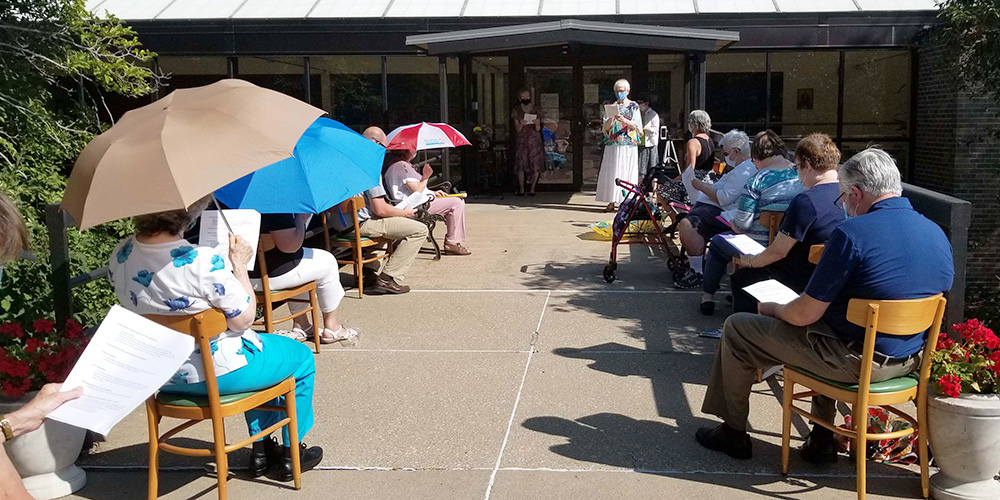
The Congregation of the Humility of Mary held a masked and socially distanced welcoming ceremony outdoors and on Zoom for four new associates in August 2020. (Courtesy of the Congregation of the Humility of Mary)
The obvious answer was to turn to online video connections, such as Zoom, Microsoft Teams or Google Meet. But for some communities, virtual connections are not the same.
"The Pathways [associate formation] course was interrupted last March, just a couple of months short of completion. Although we resumed with virtual meetings in the Fall, I feel the experience has been diminished for our candidates," Audrey Jungermann, director of Partners in Mission for the Sisters of the Most Precious Blood of O'Fallon, Missouri, wrote in an email to GSR. "We postponed starting a new group of candidates until next fall when we will hopefully be able to meet with them in person."
But many have found more than just silver linings in the situation: They have found new associates, new roles and new awareness.
"I call a lot of what's happened 'pandemic blessings,' " Connolly said. "There are associates I've talked to that have said, 'I've never felt so close to the community.' "
Virtual connections create worldwide relationships
Some congregations have found that the pandemic helped their associate program grow.
"We actually have more candidates now that we are able to use Zoom," Margo Kroshus, cojourner coordinator for the Sisters of St. Francis of Rochester, Minnesota, wrote in an email to GSR. "We have candidates from across the country that are now in process. Most have said, 'I knew about you but didn't think I could join the process due to distance.' "
Kroshus said in a later interview that people are looking for a spiritual connection in their lives, especially now that they're physically separated. The virtual connections make that possible, regardless of geography.
"They say, 'I've looked around, I like your charism, I like your mission, but because I'm not from your area, I never pursued it,' " Kroshus said. "It's been really kind of exciting."
Thanks to online video connections, the congregation now has cojourners or those in the process of becoming cojourners in Texas, North Carolina, California and Indiana.
Other congregations already had far-flung associates, but virtual meetings have brought them together.
"We have grown relationships with others in the congregation in Ireland, Scotland and France due to these frequent virtual times to come together," Amy Kulesa, director of associates for the Sisters of Bon Secours, wrote in an email to GSR.
In an interview, Kulesa said none of the associates in the United States really knew those overseas. Now, they have book studies together and every other week, they have an associate lunchtime chat. The international associates joined the annual associate retreat in September in Maryland for the first time because it was online.
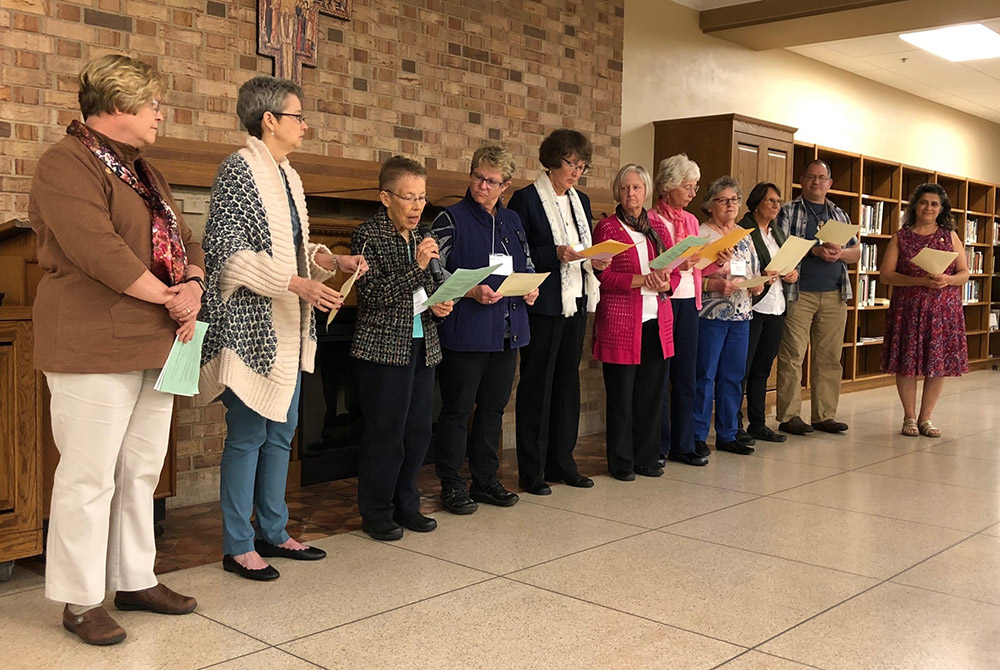
Eleven cojourners of the Sisters of St. Francis of Rochester, Minnesota, renew their covenant in October 2019 in front of an audience of other cojourners, family members and sisters. (Courtesy of the Rochester Franciscans)
Sr. Pia Lansang of the Missionary Benedictine Sisters of Tutzing in the Philippines said virtual connections have brought the order's oblates closer.
"We were never so widely spread and yet so closely-knit together spiritually and socially. Whereas before physical presence limited us to those inside a given physical space, now 'being present' can be from any point, and place, any country in the world," Lansang wrote in an email to GSR. "All this keeping in touch have been to them a source of sustenance, nourishment, hope, encouragement, a source of emotional strength, stronger faith. No one is really alone with a strong online community where each one supports the other."
Connolly said her community had an online meet-and-greet with four prospective cojourners that was profound for all.
"It was one of those things that you just know is Spirit-led," she said. "It was really very moving. Almost before I could close it down, I had an email saying it was such a beautiful evening, they felt we were in a living room together telling stories about our lives, when you could never get that many people in a living room."
The changes from the pandemic have also allowed associates to grow into roles they never expected, such as being faith leaders.
The Ursuline Sisters of Mount St. Joseph, Kentucky, gave all sisters and associates the opportunity to lead a Zoom session if they wanted.
"At first, people were leery," said Doreen Abbott, coordinator of Ursuline partnerships. "But once they saw others doing it. ..."
Abbott said more and more have volunteered, giving associates a new sense of leadership and a chance to show their individual talents, such as the associate who included a slideshow and music in her presentation.
"I was like, 'This is awesome,' " Abbott said. "They seem very happy to be able to do this."
The virtual connections extend even beyond congregational lines: Associates from the Rochester Franciscans have been doing online retreats and seminars with those from the Franciscan Sisters of Perpetual Adoration, who have been doing online events with associates of the Wheaton Franciscans. Dominican associates are also joining together across congregations.
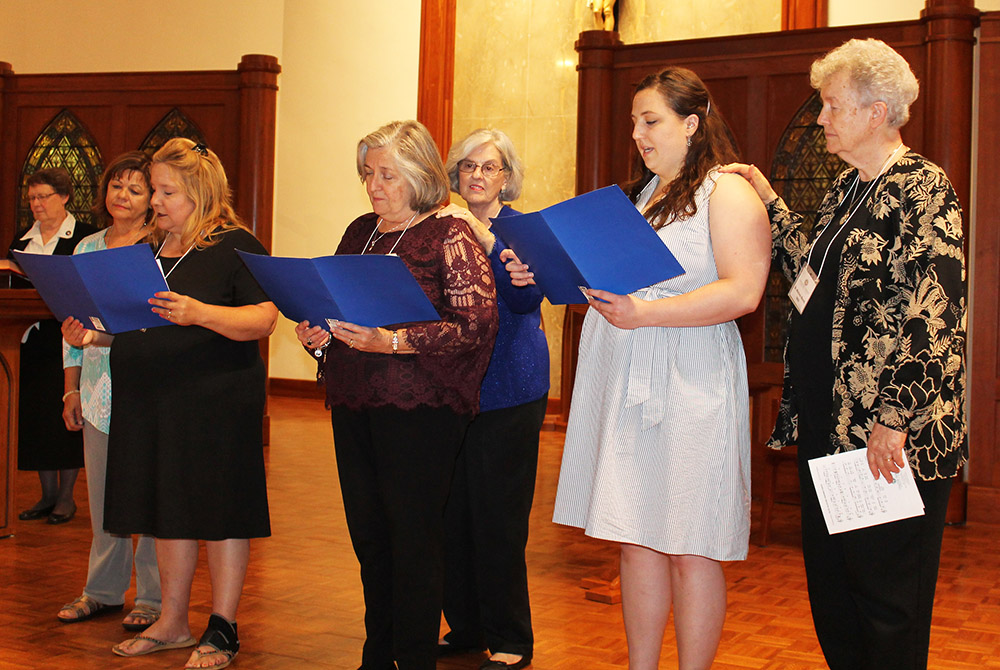
The three new associates of the Ursuline Sisters of Mount St. Joseph, Kentucky, read their commitments at the order's June 2019 Associates and Sisters Day with their contact companions. From left: Ursuline Sr. Amelia Stenger, congregational leader; associate Debbie Lanham with new associate Lori Haynes; new associate Marian Pusey with associate Pauline Goebel, and new associate Renee Schultz with Ursuline Sr. Michele Morek. Morek is Global Sisters Report's liaison to women religious and organizations in North America. (Courtesy of the Ursuline Sisters of Mount St. Joseph)
A stronger spiritual bond
The key to making virtual connections work seems to be offering what people most want during months of isolation and fear — involvement, appreciation and understanding.
For the Franciscan Sisters of Perpetual Adoration, that means involving affiliates in the activity that forms their very identity: eucharistic adoration.
The sisters in La Crosse, Wisconsin, had maintained perpetual adoration for an astonishing 142 years but no longer had enough sisters and prayer partners to keep it up. At 10 p.m. Feb. 26, 2020, they did what was previously unthinkable: They covered the host and returned it to the tabernacle. The next morning, they began a new tradition: adoration from 6 a.m. to 10 p.m. every day.
Weeks later, the pandemic arrived, and only sisters who lived in the motherhouse took the in-person adoration hours. In July, they began monthly virtual adoration, where those invited get a Zoom link to a camera facing the monstrance. Eventually, virtual adoration was offered to sisters, affiliates, prayer partners and their families from 8 a.m. to 8 p.m. every Friday.
"People really do lean into it and find it a comfort to come together in prayer," said Elizabeth Allen, the congregation's director of affiliation. "It's not the same as being in the chapel and having those surroundings, of course, but doing it that way created a bridge that was very connecting for people."
The Society of the Holy Child Jesus found a similar connection when, in the first months of the pandemic, sisters and associates gathered online daily for prayer, said Cathi Duffy, director of associates. The daily prayer meant so much to participants that it continued until mid-June, when it became a weekly gathering that continues today.
"It created a very strong community of associates from around the country," Duffy said. "A lot of them who could stay with it were retired, and they were in lockdown, so even if they went to daily Mass before, now, they couldn't get out. It did make a big difference."
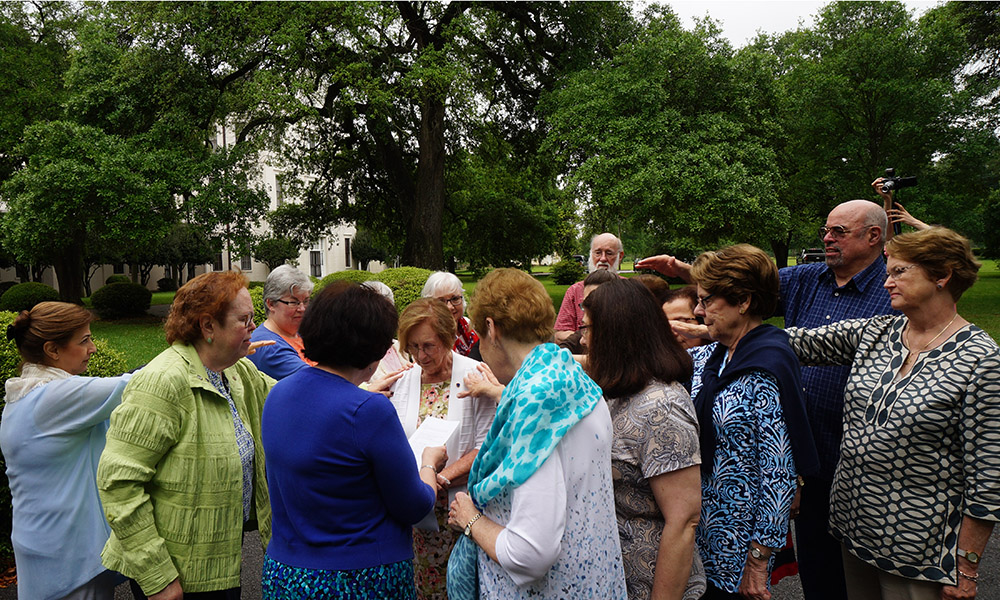
Associates of the Society of the Holy Child Jesus pray during a 2017 pilgrimage to the Grand Couteau, Louisiana, home of Cornelia Connelly, who founded the congregation in 1846. (Courtesy of the Society of the Holy Child Jesus)
It brought people together in other ways, too, she said: There had been a dividing line between generations comfortable with having much of their lives online, and older generations that were often limited to email, at best.
"So many of the sisters are elderly, and they've been forced to learn the technology," Duffy said. "It seems like it pushed the older generation forward to accept the technology and get comfortable with it. ... The power of technology as a vehicle for community has become very apparent."
The congregation also began to offer its associates an online retreat based on Ignatian spiritual exercises that they can do amid their daily life, and at Christmas, associates wrote and produced Advent reflection videos.
Another bonus: Associates who are familiar with online meeting technology can help those who are not.
Allen said the Franciscan Sisters of Perpetual Adoration's affiliates were already organized into 32 companion communities, of which two already met virtually: one via a conference call and one using online video. Those who had been meeting online created a handout to guide others through the process, giving them tips and tricks.
"When it's a whole new thing, people appreciate having a step-by-step guide," Allen said. "I feel like they paved the way, saying, 'This is successful, it works.' I would say almost half our companion communities are meeting online at this point, and the others have found other ways, like sending cards and letters in the mail or using a telephone tree."
Virtual connections have also led to new spiritual insights for associates.
Catherine McEvoy, the coordinator for the associates of the Congregation of the Sisters of Mercy in the northern part of the Irish Republic and Northern Ireland,* said the pandemic has brought them even closer to Venerable Mother Catherine McAuley, the order's foundress.
"Catherine's early companions were known as the 'walking sisters' and there is a sense in which we believe she is the sister who walks with us in this time of COVID-19 pandemic," McEvoy wrote in an email to GSR. "Because she lived through a cholera pandemic in Ireland in the 1830s, we feel she is walking with us through the COVID-19 pandemic. Every situation we are faced with in today's world, we can be sure Catherine McAuley also faced in her lifetime."
That relationship with McAuley has grown because the relationship between associates has grown, despite the physical limitations, she said.
"Because we communicate regularly and 'feed' off each other, the spiritual bond among the circles remains strong," she wrote.
Wilson from the Sisters of Charity of Cincinnati said meeting virtually has helped associates see that God is not just in the chapel.
An associate who was a companion for an associate candidate was initially disappointed the candidate wouldn't have the commitment ceremony in the motherhouse chapel, as she had, Wilson said. But she realized God was just as present in her kitchen as he is in a church or anywhere else.
"God is everywhere," Wilson said. "We're so used to that idea that you have to go to that sacred place to be close to God, and you don't."
Advertisement
The Bon Secours' Kulesa said the new connections have everyone involved in the congregation, including the associates and the young adult groups, thinking of themselves as deeply connected, which will be critical as the number of sisters continues to decline and the associates and young adults will take over. There are fewer than 20 Sisters of Bon Secours in the United States.
"More and more, we're thinking of it as the Bon Secours family," she said. "We're looking at how to appreciate and involve as a resource people from all these different states of life in the spirit and charism."
And while everyone wants to get back to "normal," associates also say they want to keep meeting virtually, as well.
"It's an odd paradox, but that is the type of thing that's happening," said Connolly of the North American Conference of Associates and Religious. "Several of the folks I've talked with have said, 'We want to retain this. That doesn't mean we don't want to see you and hug you, but we love this.' "
[Ma. Ceres P. Doyo contributed to this story from the Philippines.]
*This story has been updated to clarify that Catherine McEvoy is the coordinator for the Sisters of Mercy associates in the northern part of the Irish Republic and Northern Ireland.


